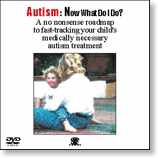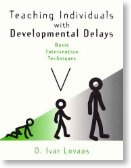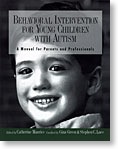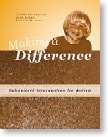Monte Python’s Cheese Shop: Canadian Edition
• excluded from the health care system and
• can wait on a social services waiting list for early intervention services for four to six years!
No, that’s not a typo.
When a child is fortunate enough to be diagnosed early at two years of age, which is almost a miracle in itself in a thoroughly dysfunctional system, the government offers the child easy access to a waiting list for treatment, with full knowledge that the child will age out before his turn comes up. We all know it is critical to start at two years of age when the child’s development window is great, but apparently that is does not keep Ontario bureaucrats up at night.
Monty Python’s parody on the dysfunctional British society of the 1970s could have been written for children with autism in Canada. Unfortunately, children with autism need quality therapy, and they need it when they are diagnosed!
The Tragedy of Canada's Autism Treatment Neglect: a leading psychologist speaks
Autism Treatment Insurance in Washington State Makes Huge Progress
Autism advocates in Washington State are not sitting still and waiting for their state legislature to pass the law. In a class action suit, Washington State public employees have just won a big legal victory. Now all children with autism whose parents are insured through the Washington State employee healthcare plan (Uniform Medical Plan) are covered for autism treatment. These children are not the only group to be covered. In addition, Washington State’s Group Health Cooperative is going to be covering another 800 autism families! I’d say that the parent advocates in Washington State are having a very productive summer!
Pennsylvania's Doctors Take Charge of Autism Treatment Standards
What’s particularly promising about the new Pennsylvania requirement is that every autism treatment practitioner, including behavior specialists, needs to complete autism-specific training. Parents of children with autism and many Board Certified Behavior Analysts who work with children on the autism spectrum have been asking for specialist standards and licensing for behavior specialists working with children with autism. Being a specialist in Applied Behavior Analysis is not sufficient when it comes to treatment for children afflicted with autism. That next step, a recognized specialty for autism treatment that ABA professionals must meet, is what makes the Pennsylvania initiative so important.
The overall effect of this change in the status quo is that requirements demanded of professionals who work with children on the Autism spectrum are going to become more rigorous over time. This means that all the kooks and quacks will no longer find the field of autism to be as warm and cozy a corner of the disability world in which to park their incompetent caboose!
Now that Pennsylvania has raised the bar, hopefully other jurisdictions will follow suit. Our children deserve no less!
Intensive Behavioral Intervention for Autism: The Fight for Coverage
With recent medical innovations in both technology and treatments, new therapies have been developed and shown to benefit those children with Autistic Spectrum Disorders. One in particular is Intensive Behavioral Treatments (IBT). The legal fight for children to receive this treatment has been an ongoing one.
But first, what is IBT? IBTs include Applied Behavior Analysis (ABA), Early Intensive Behavioral Intervention (EIBI), and Intensive Behavioral Intervention (IBI). These treatments are exercises and techniques consistently applied to autistic children for several years, for 25 to 40 hours per week; children usually work with a therapist, paraprofessional, parent, or some combination of some or all of said people. However, the involvement of children’s parents throughout the process is imperative to its success.
Beginning treatment concentrates primarily on improving behaviors such as:
General social responses
Self-stimulating behaviors
Socially non-aggressive behaviors
Early on, children are rewarded for good behavior with food although this reward is very quickly faded to non-food reinforcers; all throughout therapy, bad behaviors are rewarded with neutral responses.
Intermediate treatment concentrates primarily on:
Peer interaction.
Teaching children language skills.
Advanced treatment concentrate primarily on:
Observational learning in social settings.
Proper social emotional responses and expression.
The teaching of basic education skills.
So where is the U.S. in terms of making these therapies not only more available, but mandated for insurance to cover? As of November 1, 2011, the following 29 states have passed autism insurance reform laws according to austismvote.org:
Arizona - Enacted March 21, 2008
Arkansas - Enacted March 4, 2011
California - Enacted Oct. 9, 2011
Colorado - Enacted June 2, 2009
Connecticut - Enacted June 9, 2009
Florida - Enacted May 2, 2008
Iowa - Enacted April 29, 2010
Illinois - Enacted December 13, 2008
Indiana - Enacted May 3, 2001
Kansas - Enacted April 19, 2010
Kentucky - Enacted April 14, 2010
Louisiana - Enacted July 2, 2008
Maine - Enacted April 12, 2010
Massachusetts - Enacted August 3, 2010
Missouri - Enacted June 10, 2010
Montana - Enacted May 5, 2009
Nevada - Enacted May 29, 2009
New Hampshire - Enacted July 23, 2010
New Jersey - Enacted August 13, 2009
New Mexico - Enacted April 2, 2009
New York - Enacted Nov. 1, 2011
Pennsylvania - Enacted July 9, 2008
Rhode Island - Enacted June 30, 2011
South Carolina - Enacted June 7, 2007
Texas - Enacted June 15, 2007
Vermont - Enacted May 27, 2010
Virginia - Enacted May 6, 2011
West Virginia - Enacted April 1, 2011
Wisconsin - Enacted October 19, 2009
The following 14 states, according to autismvote.org, will pursue autism insurance reform laws in 2012:
Alabama
Alaska
Delaware
Georgia
Hawaii
Maryland
Michigan
Minnesota
Nebraska
North Carolina
Ohio
Oregon
Utah
Washington
And unfortunately, the following states are not pursuing autism insurance reform laws at this time:
Idaho
Mississippi
North Dakota
Oklahoma
South Dakota
Tennessee
Washington, DC
Wyoming
The fight for coverage of IBTs is ongoing, but it has been a successful one. If things continue as they have, it is only a matter of time before all states mandate that IBTs be covered by insurance.
Allison also writes about medical malpractice on her website, Medical Malpractice Lawyers.
When the fox guards the chicken coop: A review of the film "Medicare's Orphans"
Many films about autism understandably focus in on the miserable lives of children with autism. This can sometimes be hard to watch. Medicare’s Orphans is not that kind of film.
The documentary chronicles the protracted battle to include children with autism in the Canadian health care system. It’s a strange juxtaposition to watch since in the United States, the debate lately has been about creating a health care system where everyone is covered. In contrast, Canada already has a supposed universal health care system, yet this is a story about the systematic exclusion of the one group that is shut out of health care -- children afflicted with autism.
How strange! There is a group of Canadians who don’t get health care coverage for their core health need -- autism! I guess that’s what happens when the fox guards the chicken coop, when the health care system and the government are one in the same. When government is the health insurance provider, it apparently does a lousy job of holding itself to account where a lack of autism treatment coverage is concerned.
The film describes the amazing lengths to which Canadian parents have gone to right this wrong. It shows the important successes in the courts, and the failure of the legal system at the highest level -- the Supreme Court of Canada. The filmmakers take us on a journey from coast to coast, meeting courageous parents and their children with autism. We are introduced to one parent who actually walked 286 miles in the harsh Canadian winter to Ottawa to plead his case and raise awareness of this horrendous injustice.
We are heartened by the successes of children who were fortunate enough to receive treatment because, in some cases, their parents forfeited everything to fund the treatment. In one case, we meet a woman who has rented out every room in her home to pay for autism treatment. We are also angered and disgusted by the complete failure of the Canadian health care system, which lands one child in the psychiatric unit of an Ontario hospital.
Through all this, the message is clear. The film acts as a call to action!
Those who live in the United States need to wake up every morning and appreciate the fact that in the U.S., children with autism enjoy the protection of the Americans with Disability Act, the Individuals with Disability Education Act, the Mental Health Parity Act and the States’ Autism Mandates that are being passed daily, the most recent one in the State of New York, marking the 29th state that now legally requires insurance companies to cover the cost of effective autism treatment.
Let’s hope that Medicare’s Orphans will so thoroughly embarrass the Canadian government that it finally does something about its hypocrisy. Canada claims to be a light unto nations where universal health coverage is concerned, yet it does precisely the opposite by excluding a whole class of its citizens from healthcare - kids with autism.
Visit their website to learn more about the Medicare for Autism Now! movement.
The film "Medicare's Orphans" released today!
The long awaited film, Medicare’s Orphans was released today! The documentary chronicles the plight of children with autism in Canada, who are systematically excluded from Canada’s purportedly universal health care system.
I will provide an in depth review of this essential film in the coming days, but in the meantime, I invite you to watch this forty-two minute documentary that will change the way you look at the rights of children with autism forever. Due to the important nature of this topic to the autism community world-wide, access is currently provided free of charge.
To view the film, click on the screen below:
Medicare's Orphans. from MedicareForAutismNow on Vimeo.















